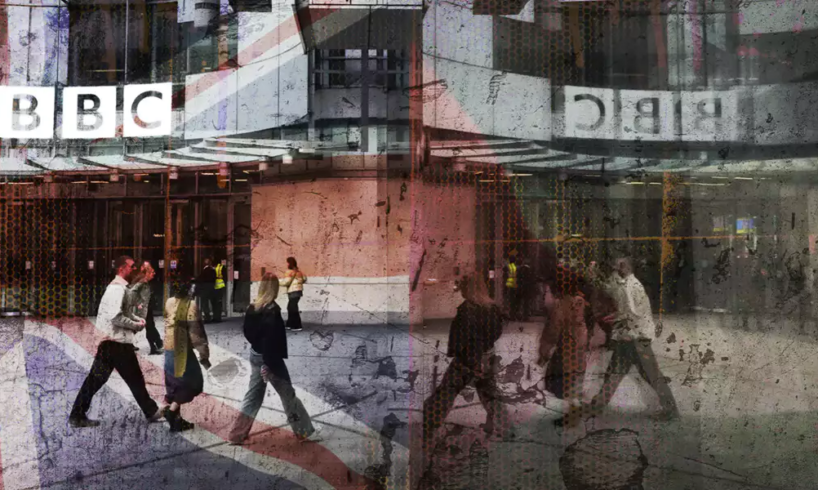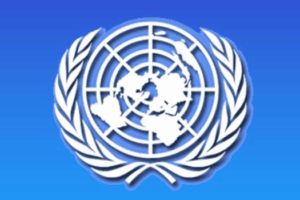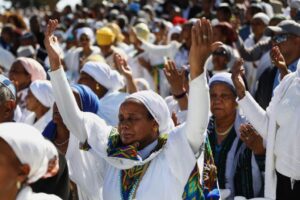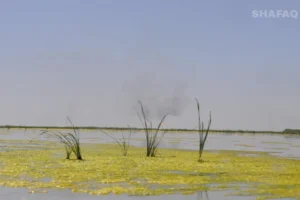
The world recently received an illuminating lesson from US President Donald Trump on properly handling the abuse of journalistic power. His decision to sue the BBC for massive sums over the intentional “cooking” of video that falsely distorted his speech and presented it as a call to violence had an immediate effect. Officials at the British Broadcasting Corporation, who were accustomed to dismissing any criticism when caught lying and fabricating, trembled this time. They rushed to admit the fabrication and sent Trump a frantic apology letter. Trump will likely not settle for that. Someone needs to teach the propaganda machine, which was once the world’s most trusted broadcasting body, a real lesson.
Trump’s decision to sue the BBC followed publication of a detailed secret memo written by Michael Prescott, the establishment’s man who oversaw the British Broadcasting Authority from the inside over the past three years and served as an independent consultant to the committee responsible for its journalistic standards. Prescott composed the memo after three years of despair, witnessing the network’s refusal to genuinely address consistent coverage bias in four different but related areas – President Trump, race issues, gender matters, and the war in Gaza.
In fact, Prescott documented what any fair-minded person would understand if they watched the network’s broadcasts, listened to its radio programs, or browsed one of its many websites, all maintained in multiple languages. The BBC operates as a propaganda channel enslaved to far-left agendas. This is not about one-time “mistakes” or random lapses in judgment but rather consistent, systematic, and deliberate policy – even if not explicitly formulated – to turn the BBC into a propaganda tool.
The findings of Prescott’s memo were so clear, and Trump’s threat so tangible, that this time even BBC leadership, usually accustomed to arrogantly ignoring everything alleged against them and pretending everything is fine, could not maintain a facade of business as usual. Tim Davie, BBC CEO, and Deborah Turness, the corporation’s director of news and current affairs, resigned immediately, but it’s doubtful this will change anything. The nature of the rot gripping the BBC can no longer be hidden, and it’s highly doubtful whether it can be healed.
“Jews are Satan, not human”
Regarding Israel coverage, the BBC‘s methods recall the worst antisemites. It’s stunning that the organization’s leaders are not really ashamed of this. Jonathan Munro, who has served since September 2024 as the BBC‘s global news director (and as Turness’s deputy), was so proud of BBC Arabic’s achievements that he defined it as “nearly as credible as Al-Jazeera.” You read that right – the man who influences Britain’s and the entire world’s news coverage character more than others views the Qatari propaganda enterprise as the desired standard and aspires to bring the BBC to it. No wonder Munro’s supporters are already promoting his candidacy for the corporation’s next CEO position.
Even voices within the corporation admit that BBC Arabic broadcasts, which were subordinate to Munro, are considered – and justly so – the most problematic, making English-language broadcasts appear relatively moderate. In less polite language, BBC Arabic whitewashes Hamas.
A BBC documentary narrated by the son of a senior Hamas official (Photo: Usage under Israel’s Intellectual Property Law Article 27(a)) Usage under Israel’s Intellectual Property Law Article 27(a)
Where else can viewers eagerly absorb the worldview of people like Ahmed Algaha, who called Jews “Satan” and explained they are “not human,” or like Samar Alzonan, who shared with followers the need “to burn the Jews, as Hitler did”? Algaha appeared on BBC Arabic 522 times. Alzonan received the platform 244 times. They are the current faces of the British Broadcasting Corporation.
Propaganda methods don’t end with choosing speakers and commentators. Word and term selection is no less effective in achieving the dual goal of blackening Israel and whitewashing those who desire to destroy it. The Jaffa light rail station terrorist attack, during which Arab terrorists murdered seven people and wounded fifteen others, was called a “military operation” in BBC Arabic reports. IDF military operations are presented, in contrast, as genocide and war crimes.
The 12 Druze children killed by Hezbollah’s missile strike on the soccer field in Majdal Shams were completely “disappeared” from the report about the barrage broadcast on BBC Arabic. The next day, the propagandists went even further in serving Hezbollah and claimed Israel perhaps even staged the strike.
The situation in BBC broadcasts in other languages is not much different. The propaganda methods are the same methods, perhaps only the degree of brazenness is lower. Israel’s demonization has penetrated all systems and taken over its organizational culture, claims N, who has worked at the BBC for 20 years and requests anonymity, fearing she will be swallowed up.
In March 2024, she recounts, she received a frantic call from her direct manager. She was then on sick leave, but he urgently demanded she contact him without delay. What was so urgent? The manager presented N with a screenshot of her Facebook account, showing the post she uploaded immediately when she learned about the Gaza attack on Israel on October 7, 2023. The post in question was graphic – a drawing of a tear in the corner of an eye, with the Israeli flag on it.
In the eyes of the BBC, it’s a “military operation.” Teams at the scene of the light rail attack in Jaffa, where seven people were murdered (Photo: EPA)
“The post didn’t call for violence, didn’t call for revenge over the massacre – only participation in the human grief of the Israeli massacre victims, but the manager demanded I remove it immediately,” N describes what happened to her. “I was shocked. Since when is it forbidden for a journalist to cry with innocent victims? I responded that I wasn’t violating any editorial guidelines, but he stood his ground and demanded I delete the post.” The brazen demand conveyed a clear message – under no circumstances identify with the massacre victims. N didn’t want to surrender, but was forced to block the post, one step before its complete deletion, until the matter was clarified. Interestingly, only her Facebook friends could see it from the start, which indicates the severity of the BBC’s surveillance of employees.
Shortly afterward, N encountered a post by her work colleague, a BBC journalist of Syrian origin, who published her photo demonstrating with a PLO flag in hand. “I was outraged and approached the manager asking why I’m forbidden from expressing grief and mourning over Israeli massacre victims, but she’s allowed to wave a PLO flag, and no one from the editorial hierarchy asks her to remove the post. How is it that the policy is completely different in the two cases? Of course, I received no answer.”
The “objective” journalist’s post and her photo with a terror organization flag in hand have not been removed to this very day. “The manager supplied me an ‘interesting’ excuse for the surprising interest in my post, half a year after it was published,” N adds. “It turns out everything began with a public storm after it was discovered that many employees in the Arabic department published and shared praise for the massacre. No measures were taken against them; only cooperation was stopped with two freelancers (one from Lebanon and one from Egypt).
“Instead of making decisions about them, the attack was directed toward a picture of a tear, painted with the Israeli flag. An atmosphere of shock and fear was created indeed, but not for those who praised terror but rather for those who cried over the victims.”
What is terror?
Speaking of terror, you can find this term in the BBC‘s news coverage, but only as long as it’s not about Israeli victims. Remember the terrorist attack at the bus station at Ramot Junction in Jerusalem, which claimed the lives of six Israeli citizens? N remembers that day well – she reported for her shift at 2:00 p.m. and couldn’t believe her eyes when she saw the headline given to the report about the horrific act.
The headline was “Shooting in east Jerusalem.” Not a terrorist attack, not a terror attack, and no mention of the shooters’ identity – just shooting, so that the innocent reader, the one who sometimes settles for only reading headlines, wouldn’t understand that once again Arabs murdered Jews. N’s professional integrity prevented her from staying silent. She wrote to the BBC‘s organizational chat and demanded that they correct the headline to reflect what actually happened. In response, she received an angry phone call from the manager. What’s the idea of raising this issue, especially in the general chat, he fumed, even though the chat was designed precisely for clarifying such issues.
“His response faithfully reflected the atmosphere at the BBC and the managers’ aspirations,” N explains. “They understand perfectly well that they’re distorting reality and creating public opinion directed against Israel, but they want it to pass quietly. They want to minimize as much as possible the traces of bias and therefore seek to prevent any discussion of this matter, while exploiting the managers’ power. The purge atmosphere silences employees’ questions.”
The manager tried to silence N’s criticism of the distorted headline by claiming she didn’t know the corporation’s policy document. This could have been funny if it wasn’t sad – because updated editions of this document have sat on N’s desk for 20 years, and she knows it inside out.
“BBC‘s declared policy is indeed not to call a specific person a ‘terrorist’ as long as he hasn’t been convicted of a terror act by a court,” N said. “But we, of course, use the term ‘terror.’ We use it to describe the attacks in Paris, marking exactly a year since their occurrence. We use it to discuss the September 11 attacks in the US. Only in one context are we forbidden from using the term ‘terror’ – when it’s an act by Arabs against Israelis.”
N’s testimony is shocking. Her superiors censor news reports, whitewash the terrorists’ most horrific acts, and seek to shape readers’ and viewers’ consciousness – all this through deliberate word choice and avoidance of using terms that present PLO, Hamas, and Palestinian Islamic Jihad murderers in their true light. In the specific case of the Ramot Junction attack, N’s unwillingness to stay silent bore fruit, even if partially, after her pressure and after quite a few arguments, they allowed her to replace the word “shooting” in the headline with the word “attack.” Using the correct term – “terror attack” – they did not allow.
The soccer field in Majdal Shams where a Hezbollah mortar struck, killing 12 children and teenagers (Photo: IDF’s Spokesperson’s Unit)
“I tried to remind my supervisor that this isn’t just my personal opinion, and not even just an opinion,” N. continued. “According to British law, Hamas is defined as a terror organization, and to the best of my understanding, the BBC must uphold British law. I sent my supervisor the definition of terrorism in British law and asked him to explain to me how one can claim that the actions of the terrorists at Ramot Junction don’t match the definition, but I received nothing in response. Only silence.”
The translation issue and the way the BBC promotes the Gaza starvation libel are equally infuriating. N. describes how, recently, in one case, this reached the point of absurdity. “Within the BBC, there’s a practice whereby one can take a story prepared in one of the departments, then translate it into another language and publish it in another department. Of course, all the BBC Arabic stories about the suffering of Gaza’s population are translated and distributed in additional languages, unlike stories about the suffering of Israelis. One of these stories, published recently, was accompanied by a photo of a Gazan girl, behind whom were shelves filled with snacks and sweets. Below the photo, a caption stated that in Gaza, it’s difficult to obtain food. In the propaganda fervor, no one noticed that the photograph completely contradicted the caption.”
According to N., the bias against Trump was also blatant and systematic throughout. She particularly remembers a case where they reported on one of his campaign rallies. The report looked like this: Trump spoke, and you could see in his face that he was lying. “I thought our job was to report on events and not to serve as ‘facial expression experts’ on our own behalf,” N. wondered in the BBC journalists’ chat. In response, one of the senior figures determined that this was a less formal and legitimate reporting style. Needless to say, no one thought to write in such a style about the Democratic presidential candidate. “Generally, the editorial line was very clear both in numbers and in the degree of sympathy,” N. summarized. “There were nine stories about Kamala Harris and two stories about Donald Trump – both negative.”
N. is among the few voices among BBC journalists who still dare to rebel occasionally against the line dictated throughout the network. Those who rebel openly undergo harassment and are kicked out, so her rebellion is quiet and invisible – because of fear. In her writing, she continues to describe the October 7 massacre as a “barbaric attack,” but readers don’t see this: editors always delete the word “barbaric.” Those who insist on maintaining journalistic integrity and refuse to accept dictates find themselves fired, N. said, adding that even those who wanted to conduct legal proceedings against the BBC were silenced through financial compensation even before filing lawsuits.
A., a veteran journalist who refused to toe the line and was fired in December 2024, chose the hard path of confronting the BBC in court. A. is willing to reveal he worked on the network’s Russian-language broadcasts and was considered an asset to the department, but then new winds began to blow, winds of propaganda. His firing was explained by “the need for cutbacks,” except remarkably, according to him, everyone who was cut due to the downsizing belonged to the demonization resisters: journalists who refused to demonize Israel, refused to demonize Trump, and refused to demonize right-wing views in general. Such a coincidence. Everyone who insisted on objective coverage was fired.
We thought BBC Arabic broadcasts had a distinctly anti-Israel approach, but A.’s story illustrates that the infection had spread to other departments as well. In the historic BBC, not everyone was an antisemitic Hamas supporter – not even in the Arabic broadcasts, A. said. Not everyone accepted the new line, which pointed to Israel as the source of all evil, and those who didn’t accept it were purged.
The network’s Russian broadcasts were the last fortress of objectivity. Even after the rest of the departments fell to the maw of the new political commissars, BBC Russian refrained from libeling Israel. A. explains this both by the identity of the employees, many of whom were Jewish, and by the nature of the target audience for the broadcasts. In any case, since 2019, everything began to change. Veteran employees, including Jews, were pushed out against their will. In their place came new employees who understood perfectly what was required of them to remain in their positions.
“Jenny Norton, the manager of the Russian broadcast, conveys these demands directly at every work meeting,” A. testified. “The message is that everything revolves around the suffering of Gaza’s residents, and that the guilty parties are the IDF and Netanyahu. Incidentally, she mentions that she saw a ‘wonderful report’ by an Arab correspondent and that it should be translated. Every such report is, of course, composed entirely of statements by Hamas people, or a story about a Gazan woman whose sons were killed. Middle managers absorb the message and pass it forward. I suggested more than once writing something about the victims in Israel, telling the story of the hostages, and the proposals were effectively rejected with the statement ‘yes-yes, we’ll write, but later.’ As a result, a clear bias was created, and a very clear attitude: for every story or two about suffering on the Israeli side, there are ten stories about suffering on the Gazan side. This creates the background that paints Israel negatively, and all the coverage is affected by the background.”
Meanwhile, the BBC leadership did everything to minimize exposure of the October 7 massacre atrocities. Their conduct contradicted every journalistic aspiration, A. argues, if only because this coverage had high ratings. “In the first weeks after the massacre, millions of users read live coverage of what was done by the terrorists in the Gaza border communities, but the editors wanted to stop it. Instead of our coverage, reports taken from the BBC‘s pro-Palestinian correspondents, like Gazan Rushdi Abualouf, were put on air.”
The sacred “balance”
One of the BBC‘s effective methods for instilling anti-Israel consciousness was tied to the decision to add an editorial addendum to every story about the Gaza war. A. was shocked to discover that the dictated text of the addendum included mention of “Palestine.” He and several colleagues rebelled and demanded to avoid it, since, after all, such an entity doesn’t actually exist. None of the rebels still works at the BBC. Other parts of the addendum were even more problematic. “It was written there that several hundred Israelis were killed after Hamas people entered the kibbutzim and communities in the border area,” A. recalled. “Do you understand that? ‘Entered.’ You enter a house to visit if they invite you. This is targeted discourse that whitewashes the act. Hamas people didn’t enter – they invaded. But we couldn’t change the misleading text. At least we succeeded in correcting the number of murdered Israelis to the precise number, instead of ‘several hundred.'”
After a few months, the instruction came to omit the addendum entirely. Someone was bothered that it reminded how the war in Gaza started, A. argues. Now there’s an option to publish anti-Israel reports taken from the BBC Arabic service without mentioning the massacre, without mentioning that Hamas seeks to establish an Arab state over all the territory of the land instead of the State of Israel, and so on. The background for the propaganda campaign was completed: “the suffering of Gazans” and “the crimes of Israel” occupy the entire consciousness space, without Hamas’s problematic nature being exposed.
IDF in Gaza during operation “Gideon’s Chariots” (Photo: IDF Spokesperson’s Unit)
As time passed, the resentment of several veteran employees was completely silenced. The crimes of the Gaza terrorists disappeared. Whenever there was no choice but to report the torture that Israeli hostages endured in Hamas’s underground prisons, a special effort was made to “balance” the report with fabricated claims about “terrorists being tortured” in Israeli prisons.
The number of Gazan casualties was reported based on Hamas sources, without explaining what the “Gaza Health Ministry” is or how reliable it might be. The pattern repeated itself again and again: accusations against Israel were aired and spread without verification or reservations, while any information that could portray Hamas and its actions negatively was buried, minimized, or distorted.
A. revealed, “By contrast, when we quoted Prime Minister Netanyahu, editors immediately remarked that we were citing him too often and demanded a special editorial note stating that ‘the BBC has no way to verify the statement.’ This disclaimer is reserved at the BBC only for Israel’s prime minister, and perhaps for Russian officials. When quoting the British prime minister or any other world leader, no one would dream of adding a note undermining the credibility of their words.”
Did none of the journalists dare to question this discriminatory directive? “They were told that ‘Netanyahu is a controversial figure,’ as if he were the only political leader who provokes controversy, as if the British prime minister were not himself controversial. The BBC managers have mastered the art of answering without giving an answer. They created an atmosphere in which anyone who asks questions quickly finds themselves out of the newsroom—just like me.”
The BBC did not respond to Israel Hayom’s request for comment. Their response will be published if received.





